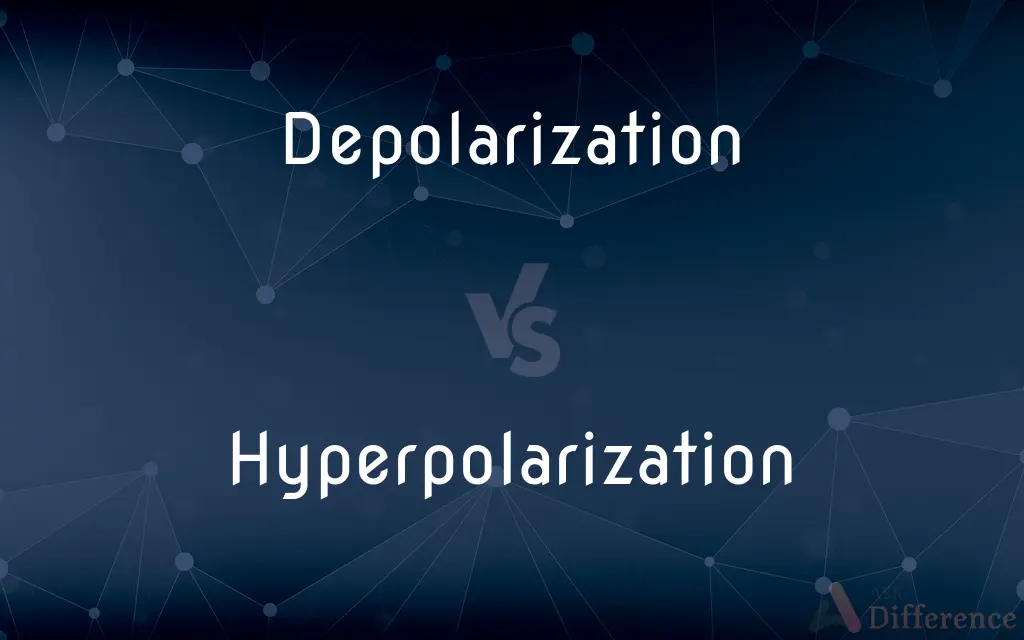Depolarization vs. Hyperpolarization — What's the Difference?
By Tayyaba Rehman & Urooj Arif — Updated on April 4, 2024
Depolarization is the process of reducing the membrane potential, making the inside of a cell less negative compared to the outside. Hyperpolarization makes the membrane potential more negative, moving further from the threshoshold needed for activation.

Difference Between Depolarization and Hyperpolarization
Table of Contents
ADVERTISEMENT
Key Differences
Depolarization is a crucial step in the firing of neurons and muscle cells, where the membrane potential becomes more positive, moving toward zero or even becoming slightly positive. This change is primarily due to the influx of positively charged ions, such as sodium (Na+), into the cell. Hyperpolarization, on the other hand, occurs when the membrane potential becomes more negative than the resting potential, often due to the efflux of potassium ions (K+) or the influx of chloride ions (Cl-), making it less likely for the neuron to fire.
During depolarization, the change in membrane potential can trigger an action potential if the depolarization reaches a certain threshold, leading to the propagation of a signal along the neuron. Hyperpolarization makes the cell's interior more negative, increasing the membrane potential and thus stabilizing the cell, preventing unwanted action potentials. This mechanism ensures that signals are only sent when necessary and helps in the termination of action potentials, contributing to the refractory period.
The speed and extent of depolarization are critical for the rapid transmission of signals in the nervous system, allowing for quick responses to stimuli. Hyperpolarization, while slowing down signaling, plays a vital role in resetting the neuron's state after an action potential and controlling the frequency of neuronal firing, thus modulating signal strength and duration.
Both processes are essential for the rhythmic activity in certain types of neurons and for the modulation of synaptic activity, influencing learning, memory, and various physiological responses. Depolarization can lead to excitation of the cell, while hyperpolarization is generally associated with inhibition.
In terms of medical and physiological implications, abnormal depolarization or hyperpolarization patterns can lead to disorders of the nervous system, including epilepsy, where excessive depolarization occurs, or certain types of neuropathic pain, where there may be issues with hyperpolarization. Understanding these processes is crucial for developing treatments for such conditions.
ADVERTISEMENT
Comparison Chart
Membrane Potential Change
Decrease, making inside less negative
Increase, making inside more negative
Triggering Ions
Influx of Na+ (sodium)
Efflux of K+ (potassium) or influx of Cl- (chloride)
Effect on Neuron
Increases likelihood of firing action potential
Decreases likelihood of firing action potential
Physiological Role
Signal propagation, muscle contraction
Stabilization, preventing unwanted firing
Associated With
Excitation
Inhibition
Compare with Definitions
Depolarization
A critical step in muscle excitation, leading to contraction.
Depolarization of muscle fibers triggers the contraction necessary for movement.
Hyperpolarization
A process that stabilizes the neuronal membrane, preventing excessive firing.
Hyperpolarization ensures that neurons do not continuously fire.
Depolarization
Reduction in membrane potential difference in neurons.
Depolarization must reach the threshold to trigger an action potential.
Hyperpolarization
A mechanism for controlling the frequency of neuron firing.
Through hyperpolarization, the nervous system modulates the strength of signals.
Depolarization
The process of making the neuronal membrane less negative, leading towards an action potential.
The sudden influx of sodium ions causes depolarization, initiating a nerve impulse.
Hyperpolarization
A condition that contributes to the refractory period in neurons.
Hyperpolarization during the refractory period prevents the immediate generation of another action potential.
Depolarization
A phase in cardiac muscle cells contributing to the heart's contraction.
Depolarization of the atria results in the atrial contraction.
Hyperpolarization
Inhibition of action potentials through increased negativity.
Hyperpolarization of a neuron can inhibit signal transmission, reducing activity.
Depolarization
A condition necessary for the transmission of electrical signals.
Without depolarization, neurons cannot transmit signals efficiently.
Hyperpolarization
An increase in membrane potential making the interior of a cell more negative.
Following an action potential, hyperpolarization helps reset the neuronal state.
Depolarization
In biology, depolarization (British English: Depolarisation) is a change within a cell, during which the cell undergoes a shift in electric charge distribution, resulting in less negative charge inside the cell. Depolarization is essential to the function of many cells, communication between cells, and the overall physiology of an organism.
Hyperpolarization
The act or process of hyperpolarizing.
Depolarization
To partially or completely eliminate or counteract the polarization of.
Depolarization
To remove magnetic properties from; demagnetize.
Depolarization
The act of reducing polarity, or the result of such action; reduction to an unpolarized or less polarized condition.
Depolarization
An intracellular shift in electrical charge distribution, resulting in less negative charge inside the cell compared with outside; it is essential to the function of many cells, communication between cells, and the overall physiology of an organism.
Depolarization
(sociology) Reduction of political polarization.
Depolarization
The act of depriving of polarity, or the result of such action; reduction to an unpolarized condition.
Depolarization
A loss of polarity or polarization
Common Curiosities
What triggers depolarization in a neuron?
Depolarization is triggered by the influx of sodium ions (Na+) into the neuron, decreasing the membrane potential.
How does hyperpolarization affect neuron firing?
Hyperpolarization makes the inside of a neuron more negative, reducing its likelihood of firing an action potential, thus inhibiting signal transmission.
What role does depolarization play in the heart?
Depolarization in heart muscle cells triggers contractions, contributing to the heart's pumping action.
How are these processes measured?
Depolarization and hyperpolarization are measured using electrophysiological techniques, such as patch-clamp recordings, to observe changes in membrane potential.
How do depolarization and hyperpolarization affect the brain?
These processes regulate brain activity by controlling the firing of neurons, affecting everything from reflexes to complex behaviors and thoughts.
Can depolarization and hyperpolarization occur simultaneously?
In a single neuron, depolarization and hyperpolarization occur sequentially rather than simultaneously, as part of the action potential cycle.
What happens if depolarization does not reach the threshold?
If depolarization does not reach the threshold, an action potential is not triggered, and the neuron does not fire.
Can hyperpolarization occur in muscle cells?
While less common than in neurons, hyperpolarization can occur in muscle cells, affecting their excitability and function.
Can a neuron fire during hyperpolarization?
No, hyperpolarization increases the membrane potential beyond the resting state, making it less likely for the neuron to fire.
How do drugs affect depolarization and hyperpolarization?
Some drugs can alter ion flow across membranes, affecting depolarization and hyperpolarization to either stimulate or inhibit neuronal activity.
What is the importance of the refractory period?
The refractory period ensures that each action potential is a separate, all-or-nothing event and helps dictate the direction of signal propagation.
Is hyperpolarization always inhibitory?
Yes, hyperpolarization is generally considered inhibitory because it makes neurons less likely to fire an action potential.
What is the threshold potential?
The threshold potential is the critical level to which a membrane potential must be depolarized to initiate an action potential.
Are depolarization and hyperpolarization reversible?
Yes, these processes are reversible; neurons can return to their resting potential after depolarization or hyperpolarization.
How do these processes contribute to learning and memory?
Depolarization and hyperpolarization play key roles in synaptic plasticity, the mechanism underlying learning and memory by strengthening or weakening synaptic connections.
Share Your Discovery

Previous Comparison
Notice vs. Note
Next Comparison
Culture vs. LifestyleAuthor Spotlight
Written by
Tayyaba RehmanTayyaba Rehman is a distinguished writer, currently serving as a primary contributor to askdifference.com. As a researcher in semantics and etymology, Tayyaba's passion for the complexity of languages and their distinctions has found a perfect home on the platform. Tayyaba delves into the intricacies of language, distinguishing between commonly confused words and phrases, thereby providing clarity for readers worldwide.
Co-written by
Urooj ArifUrooj is a skilled content writer at Ask Difference, known for her exceptional ability to simplify complex topics into engaging and informative content. With a passion for research and a flair for clear, concise writing, she consistently delivers articles that resonate with our diverse audience.














































